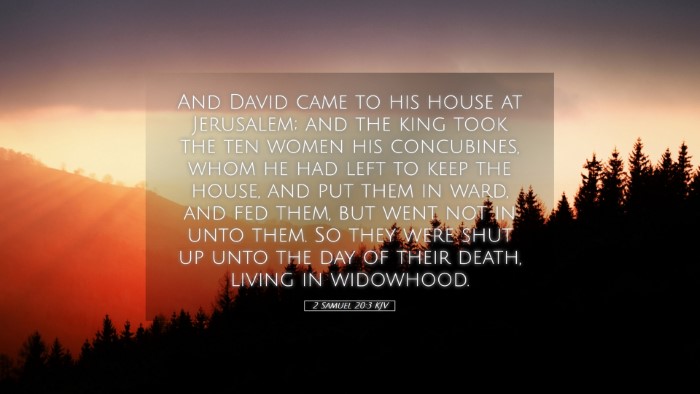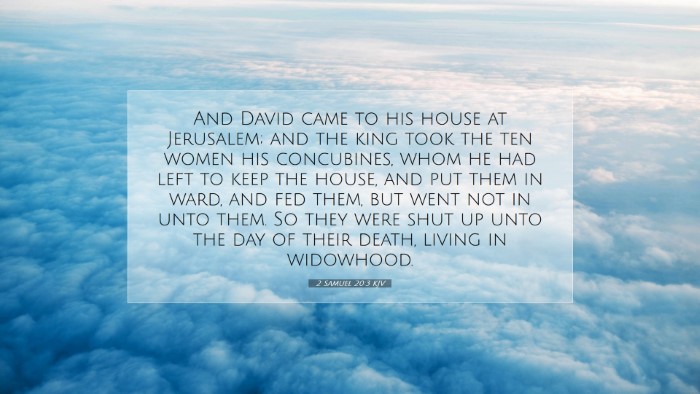Commentary on 2 Samuel 20:3
Verse: “And David came to his house at Jerusalem; and the king took the ten women his concubines, whom he had left to keep the house, and put them in ward, and fed them, but went not in unto them. So they were shut up unto the day of their death, living in widowhood.”
Introduction
This verse appears in a context that emphasizes the personal and political turmoil in the life of King David following the rebellion of Absalom. It highlights not only a personal loss but also the theological and sociopolitical ramifications of his decisions. The comments from the historical context provide depth to the implications of David's actions as a ruler.
Theological Insights
Matthew Henry: Henry draws attention to the gravity of David's situation. The concubines, a significant aspect of royal life in ancient Israel, symbolize the king's status, yet they are also victims in the wake of Absalom's uprising. Their confinement reflects the consequences of David's sin and the nature of the political landscape, raising questions of justice and mercy in the rulership of Israel.
Albert Barnes: Barnes elucidates the cultural importance of concubines, explaining that they were more than mere companions; they were integral to the royal household. David's decision to isolate them showcases his awareness of the fallout from Absalom's rebellion and signifies a change in his ability to govern. The act of feeding them but not having relations with them also serves as a poignant reminder of David’s shift in priorities and his relationship with God following his previous failures.
Adam Clarke: Clarke emphasizes the emotional impact of this incident, pointing out how the well-being of the concubines comes at a heavy price. He notes that while the concubines were sustained materially, they were emotionally and spiritually abandoned. Clarke posits that this reflects not only David's punishment but also serves as a warning about the implications of leadership and the depth of one's responsibilities towards others in positions of power.
Historical Context
Understanding the historical background is crucial for interpreting this passage. Following the civil unrest instigated by Absalom, David's return to Jerusalem was marked by significant tension. This verse encapsulates a moment of both restoration and consequence. The care extended toward the concubines is contrasted sharply with David's emotional and relational isolation.
- Political Ramifications: David's actions in consolidating his power following the rebellion depict the essential themes of restoration and loss, drawing attention to the tension between personal sin and public duty.
- Relational Implications: This verse also serves to highlight how leadership decisions can affect those who are vulnerable within a kingdom. The fate of the concubines reflects wider societal implications of abandonment and widowhood in a patriarchal society.
Spiritual Lessons
The spiritual implications of David's treatment of the concubines reflect both personal and corporate themes in the life of faith for leaders and laypeople alike:
- Consequences of Sin: The verse is a somber reminder that actions have repercussions. David's past sins led to a disrupted family and kingdom, underscoring the need for integrity in leadership.
- God's Sovereignty: Despite the tragic circumstances, it is essential to recognize God's overarching sovereignty in David's life. This period of confinement for the concubines symbolizes the broader theme of God working through the chaos of human sin.
Conclusion
In examining 2 Samuel 20:3, we encounter a profound blend of personal, theological, and historical reflections. The passage serves as a vital reminder of the weight of leadership and the imperative for righteousness and compassion. The insights from Matthew Henry, Albert Barnes, and Adam Clarke collectively emphasize the moral complexities within the narrative, enabling pastors, students, theologians, and Bible scholars to extract applicable lessons for contemporary faith and leadership.


